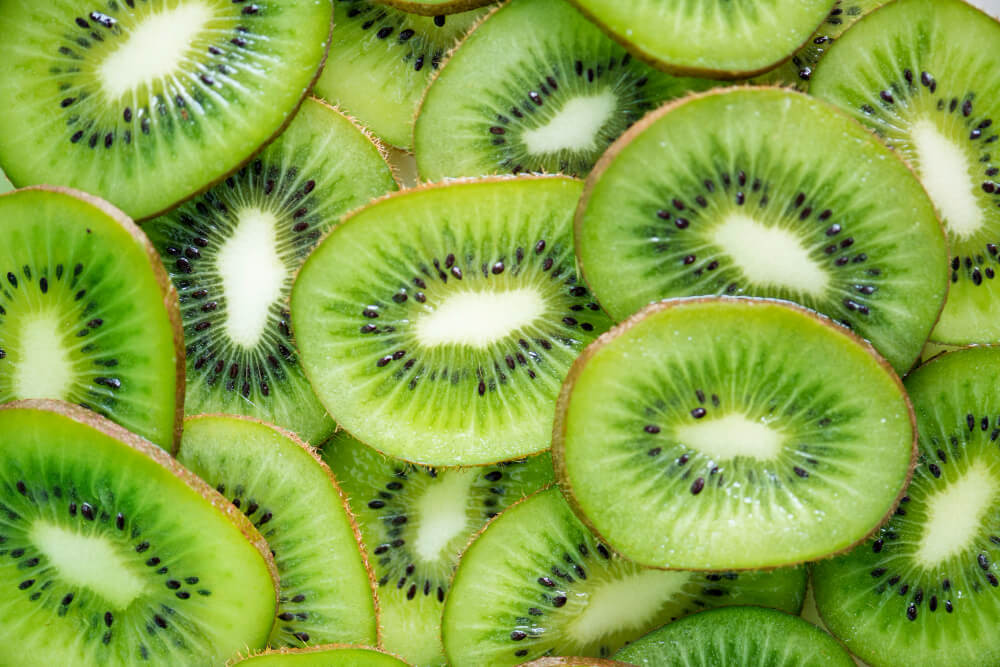Kiwi fruit is commonly included in salads, puddings, or desserts. Besides its refreshing taste, the consumption of kiwi fruit has numerous health benefits. What are the benefits of consuming kiwi fruit for your health? Please take a look at the following review:
Nutritional composition of kiwi fruit
The kiwi fruit is endemic to the highlands and hillsides of Southwest China. This fruit, which is characterized by its soft hair and thick skin, is now easily found in numerous countries, such as New Zealand and the United States.
Kiwi is a type of food in the botanical world. This type of kiwi is the most famous. It has green flesh and black seeds. Kiwis have thick skin, so you need to peel them before you eat them. It is necessary to peel the hairy skin of most varieties of kiwis before eating them. It is possible to consume the skin of certain species of kiwi, such as gold or yellow kiwi, because it is more tender than the skin of green kiwi.
A high concentration of vitamin C is a characteristic of kiwi fruit. However, kiwi fruit is not only rich in vitamin C, but it also contains fiber and antioxidants that are beneficial for protecting the body from the impacts of free radicals.
A 140-gram serving of kiwi fruit comprises the following:
- Calories: 90
- Protein: 1 gram
- Fat: 1 gram
- Carbohydrates: 21 grams
- Fiber: 5 grams
- Sugar: 15 grams
The kiwi fruit is also rich in a variety of antioxidants, minerals, and vitamins. In 100 grams of kiwi fruit, the following nutrients are present:
- Vitamin C: 83% of the Daily Value (DV)
- Vitamin E: 9% of DV
- Vitamin K: 34% of DV
- Folate: 7% of DV
- Copper: 15% of DV
- Potassium: 4% of DV
- Magnesium: 4% of the DV
- Beta carotene: 35.9 mcg
- Lutein & zeaxanthin: 84.2 mcg
Read more: Benefits And Risks Of Consumption Of Chlorofil Supplements
Health benefits of kiwi fruit
Vitamin C, fiber, and beneficial antioxidants are a few of the components found in kiwi fruit. Kiwi's antioxidant content helps in body free radical elimination. Accumulated free radicals pose a threat to cells due to oxidative stress. This cell damage can cause cancer or heart disease.
Several health benefits of kiwi fruit include:
Maintain healthy skin
Kiwi fruit's vitamin C concentration stimulates collagen synthesis, thereby helping to tighten the skin, stop early ageing, and treat dry skin. With 64 mg of vitamin C in one kiwi fruit weighing 69 grams, this is enough for about 85% of adult vitamin C needs.
Vitamin E, or tocopherol, is also present in kiwi fruit. In order to prevent skin problems, the antioxidants in vitamin E may help protect the skin from damaging effects of ultraviolet radiation.
Maintain blood pressure and heart function
According to research, eating kiwi fruit can help reduce the risk of heart disease, such as high blood pressure. Three kiwis every day for eight weeks lowered blood pressure more than one apple per day.
Maintain digestive health
Soluble and insoluble fiber are present in kiwi fruit. kiwi fruit's soluble fiber may help in the regulation of blood sugar and heart function, as well as the maintenance of digestive tract health. In the meantime, insoluble fiber helps to maintain regular bowel movements. Kiwi fruit is advised for treating constipation a lot because of these advantages.
There are several health benefits associated with kiwi fruit, one of which is that it strengthens the immune system. You may eat it raw or make juice, salads, and smoothies with it. If you need medical advice or consultation, you can either visit a doctor or make use of the consultation features that are available in the Ai Care application by downloading the Ai Care application from the App Store or Play Store.
Looking for more information about nutrition, food, and other diet tips? Click here, yes!
- dr Nadia Opmalina
WebMD Editorial Contributors. Health Benefits of Kiwi. Available from: https://www.webmd.com/diet/health-benefits-kiwi
Kubala, J. (2023). 4 Health Benefits of Kiwi. Available from: https://www.healthline.com/nutrition/kiwi-benefits
Cleveland Clinic. (2023). 6 Health Benefits of Kiwifruit. Availabla from: https://health.clevelandclinic.org/kiwi-benefits
Ware, M. (2019). What are the health benefits of kiwifruit?. Available from: https://www.medicalnewstoday.com/articles/271232












